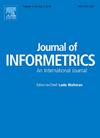Two separated worlds: On the preference of influence in life science and biomedical research
IF 3.5
2区 管理学
Q2 COMPUTER SCIENCE, INTERDISCIPLINARY APPLICATIONS
引用次数: 0
Abstract
We introduced a new metric, “citation enrichment”, to measure country-to-country influence using citation data. This metric evaluates the degree to which a country prefers to cite another country compared to a random citation process. We applied the citation enrichment method to over 12 million publications in the life science and biomedical fields and we have the following key findings: 1) The global scientific landscape is divided into two separated worlds where developed Western countries exhibit an overall mutual under-influence with the rest of the world; 2) Within each world, countries form clusters based on their mutual citation preferences, with these groupings strongly associated with their geographical and cultural proximity; 3) The two worlds exhibit distinct patterns of the influence balance among countries, revealing underlying mechanisms that drive influence dynamics. We have constructed a comprehensive world map of scientific influence which greatly enhances the deep understanding of the international exchange of scientific knowledge. The citation enrichment metric is developed under a well-defined statistical framework and has the potential to be extended into a versatile and powerful tool for bibliometrics and related research fields.
两个分离的世界:论生命科学和生物医学研究的影响力偏好
我们引入了一个新的指标,“引文丰富性”,利用引文数据衡量国与国之间的影响力。与随机引用相比,该指标评估了一个国家更喜欢引用另一个国家的程度。我们将引文富集方法应用于1200多万份生命科学和生物医学领域的出版物,我们得到了以下主要发现:1)全球科学景观分为两个独立的世界,西方发达国家与世界其他地区总体上相互影响不足;2)在每个世界中,国家根据彼此的引用偏好形成集群,这些分组与他们的地理和文化邻近性密切相关;3)这两个世界表现出不同的国家间影响力平衡模式,揭示了推动影响力动态的潜在机制。我们构建了一个全面的世界科学影响力地图,极大地增进了对国际科学知识交流的深刻理解。引文丰度度量是在一个定义良好的统计框架下发展起来的,有可能扩展为文献计量学和相关研究领域的一个多功能和强大的工具。
本文章由计算机程序翻译,如有差异,请以英文原文为准。
求助全文
约1分钟内获得全文
求助全文
来源期刊

Journal of Informetrics
Social Sciences-Library and Information Sciences
CiteScore
6.40
自引率
16.20%
发文量
95
期刊介绍:
Journal of Informetrics (JOI) publishes rigorous high-quality research on quantitative aspects of information science. The main focus of the journal is on topics in bibliometrics, scientometrics, webometrics, patentometrics, altmetrics and research evaluation. Contributions studying informetric problems using methods from other quantitative fields, such as mathematics, statistics, computer science, economics and econometrics, and network science, are especially encouraged. JOI publishes both theoretical and empirical work. In general, case studies, for instance a bibliometric analysis focusing on a specific research field or a specific country, are not considered suitable for publication in JOI, unless they contain innovative methodological elements.
 求助内容:
求助内容: 应助结果提醒方式:
应助结果提醒方式:


